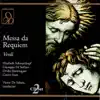Victor de Sabata Biography
Victor Alberto de Sabata (10 April 1892 – 11 December 1967) was an Italian conductor and composer. He is widely recognized as one of the most distinguished operatic conductors of the twentieth century, especially for his Verdi, Puccini and Wagner. De Sabata was acclaimed for his interpretations of orchestral music. Like his near contemporary Wilhelm Furtwängler, de Sabata regarded composition as more important than conducting but achieved more lasting recognition for his conducting than his compositions. De Sabata has been praised by various authors and critics as a rival to Toscanini for the title of greatest Italian conductor of the twentieth century, and even as "perhaps the greatest conductor in the world". In 1918, aged 26, de Sabata was appointed conductor of the Monte Carlo Opera, performing a wide variety of late-19th century and contemporary works, and earning acclaim from Maurice Ravel. De Sabata became the music director at La Scala in Milan, a post he would hold for over 20 years. His animated conducting style led one observer to describe his appearance in performance as "a cross between Julius Caesar and Satan." Following World War II, his career expanded internationally. He was a frequent guest conductor in London, New York and other American cities. His post-war operatic work included celebrated collaborations with Maria Callas and Renata Tebaldi, most notably his famous recording of Tosca with Callas in 1953. His career was cut short by a heart attack that same year.



















![Stream & download Tristan und Isolde [excerpts]](https://is5-ssl.mzstatic.com/image/thumb/Music/v4/24/56/aa/2456aaa7-e8ae-39af-9685-43c005258e92/885150979204.jpg/100x100.webp)































